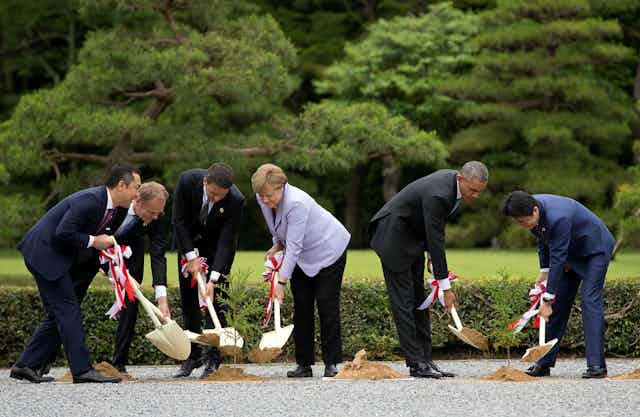President Barack Obama’s trip to Asia this week highlights how a key element of his would-be legacy is hanging by a precariously thin thread: the Trans-Pacific Partnership (TPP).
That mammoth trade deal, which spans a dozen Pacific Rim nations from the U.S. and Canada to Japan and Australia, took seven years to negotiate and would lower tariffs and other trade barriers and make it easier to settle disputes.
The accord’s chances have greatly dimmed as the issue of free trade took center stage on the campaign trail thanks to the rise of Donald Trump and Bernie Sanders, uniting much of the right and left against another deal that could cost Americans jobs. Democratic frontrunner Hillary Clinton has said she now opposes it as well, potentially making the lame duck session following the presidential election its only chance for passage.
Obama has been urging his allies to ignore the noise and get it approved quickly, despite their own domestic opposition.
We’ve been closely examining the TPP and free trade in recent months to help readers better understand what’s in it and what’s at stake. Here’s a roundup of some of our articles from the U.S. and our colleagues elsewhere.
America turns against trade
Can free trade and TPP survive rise of the ‘new right’?
The Trans-Pacific Partnership is one of the biggest accomplishments of Obama’s second term, writes Charles Hankla of Georgia State. Can it survive the anti-trade tide in the race to replace him?
Free trade is once again tearing apart the Republican Party
In 1872, free traders split with the young Republican Party, ran a third-party candidate against Ulysses S. Grant and sparked 100 years of GOP protectionism. University of Exeter’s Marc-William Palen wonders: is history repeating itself?
We may have cinched TPP, but is U.S. trade a lost cause?
Michigan State’s Tomas Hult notes how the signing of the TPP belies the fact that the U.S.’s share of trade in the Asia-Pacific region has been declining for some time.
What’s in it and what’s the problem
TPP trade pact still needs improvements to protect governments from foreign suits
Texas A&M’s Peter Yu argues that the trade deal can and should be improved to create better safeguards in the mechanism that allows investors to sue states.
TPP revealed: at last we have the details – and a democratic deficit to be fixed
TPP negotiations have been covered in secrecy, and now as details have been released it only shows a wider democratic deficiency, argues Jean-Paul Gagnon of the University of Canberra.
Catch of the day: the TPP might be good news for sustainable fisheries
While the TPP has come under attack for its environmental credentials, University of Melbourne’s Margaret Young sees hope for the fight against overfishing.
Japan’s ‘sacred’ rice farmers brace for Pacific trade deal’s death sentence
Japanese farmers worry that the TPP will open the doors to a flood of rice from the U.S. that will end their way of life, writes Bryant University’s Nicole Freiner, who spent time with the farmers.
Other countries weigh in
Turnbull tells US legislators: look at ‘big picture’ benefits of Trans-Pacific Partnership
Australian Prime Minister Malcolm Turnbull has directly lobbied United States legislators to pass the TPP, according to Michelle Grattan of the University of Canberra.
Japan may have tricky time passing TPP after making concessions on rice, beef
Japan’s decision to lower or eliminate tariffs on rice, pork and beef may end up giving the prime minister a headache as he tries to get the trade accord through parliament, writes Freiner of Bryant.
Does China care that it was left out of the Trans-Pacific trade club?
Some say the TPP was designed specifically to exclude or even encircle China. Texas A&M’s Yu asks, do its leaders care?

